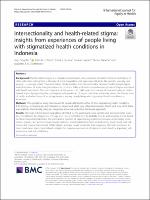Big Data and the Study of Social Inequalities in Health: Expectations and Issues
| Cyrille Delpierre
Michelle Kelly -Irving |
|
| 2018-10-26 | |
| Frontiers in Public Health | |
|
Understanding the construction of the social gradient in health is a major challenge in the field of social epidemiology, a branch of epidemiology that seeks to understand how society and its different forms of organization influence health at a population level. Attempting to answer these questions involves large datasets of varied heterogeneous data suggesting that Big Data approaches could be then particularly relevant to the study of social inequalities in health. Nevertheless, real challenges have to be addressed in order to make the best use of the development of Big Data in health for the benefit of all. The main purpose of this perspective is to discuss some of these challenges, in particular: (i) the perimeter and the particularity of Big Data in health, which must be broader than a vision centerd solely on care, the individual and his or her biological characteristics; (ii) the need for clarification regarding the notion of data, the validity of data and the question of causal inference for various actors involved in health, such data as researchers, health professionals and the civilian population; (iii) the need for regulation and control of data and their uses by public authorities for the common good and the fight against social inequalities in health. To face these issues, it seems essential to integrate different approaches into a close dialog, integrating methodological, societal, and ethical issues. This question cannot escape an interdisciplinary approach, including users or patients. |
|
| Global Health
Social determinants of health Embodiment Big data Health policy Health equity |
|
| Journal | |
| 5 p | |
| Text | |
| application/pdf | |
| Open access | |
| https://resources.equityinitiative.org/handle/ei/478 |
This item appears in the following Collection(s) |
|
|
Collections
|
Related items
Showing items related by title, author, creator and subject.
-
Human resources for health: task shifting to promote basic health service delivery among internally displaced people in ethnic health program service areas in eastern Burma/Myanmar
Low, Sharon; Tun, Kyaw Thura; Mhote, Naw Pue Pue; Htoo, Saw Nay; Maung, Cynthia; Kyaw, Saw Win; Oo, Saw Eh Kalu Shwe; Pocock, Nicola Suyin (2014-09-29)
Background: Burma/Myanmar was controlled by a military regime for over 50 years. Many basic social and protection services have been neglected, specifically in the ethnic areas. Development in these areas was led by the ethnic non-state actors to ensure care and the availability of health services for the communities living in the border ethnic-controlled areas. Political changes in Burma/Myanmar have been ongoing since the end of 2010. Given the ethnic diversity of Burma/Myanmar, many challenges in ensuring health service coverage among all ... -
Can mHealth and eHealth improve management of diabetes and hypertension in a hard-to-reach population? —lessons learned from a process evaluation of digital health to support a peer educator model in Cambodia using the RE-AIM framework
Steinman, Lesley; Pelt, Maurits van; Hen, Heang; Chhea, Chhorvann; Lan, Channe Suy; Te, Vannarath; LoGerfo, James; Fitzpatrick, Annette L. (2020-10-05)
Background: The burden of non-communicable diseases (NCDs) is increasing in low- and middle-income countries (LMICs) where NCDs cause 4:5 deaths, disproportionately affect poorer populations, and carry a large economic burden. Digital interventions can improve NCD management for these hard-to-reach populations with inadequate health systems and high cell-phone coverage; however, there is limited research on whether digital health is reaching this potential. We conducted a process evaluation to understand challenges and successes from a digital ... -
Intersectionality and health-related stigma: insights from experiences of people living with stigmatized health conditions in Indonesia
Rai, Sarju Sing; Peters, Ruth M. H.; Syurina, Elena V.; Irwanto, Irwanto; Naniche, Denise; Zweekhorst, Marjolein B. M. (International Journal for Equity in Health, 2020-12)
Abstract Background Health-related stigma is a complex phenomenon, the experience of which intersects with those of other adversities arising from a diversity of social inequalities and oppressive identities like gender, sexuality, and poverty – a concept called “intersectionality”. Understanding this intersectionality between health-related stigma and other forms of social marginalization can provide a fuller and more comprehensive picture of stigma associated with health conditions. The main objective ...



